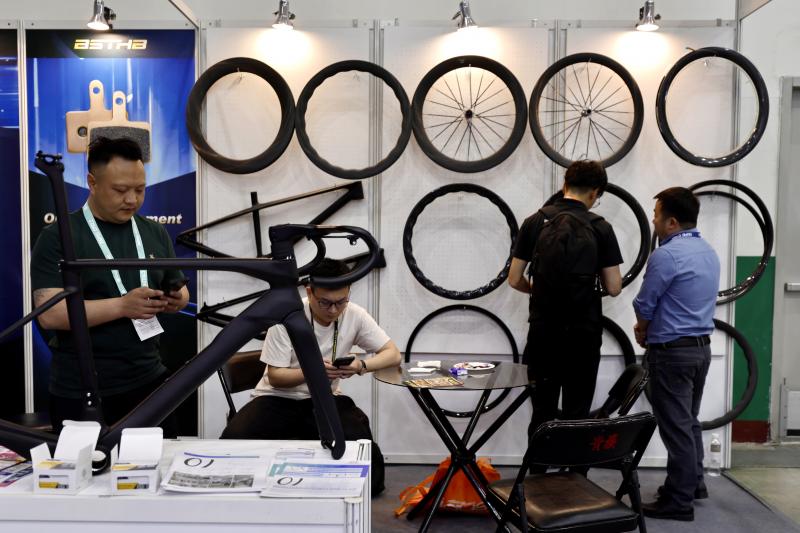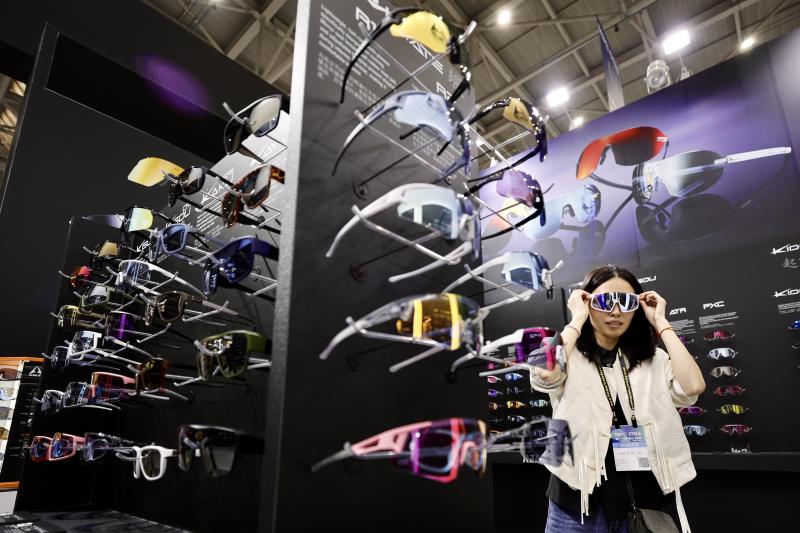The Taipei International Cycle Show (Taipei Cycle) yesterday opened at the Taipei Nangang Exhibition Center, with the event’s organizer expecting a steady recovery in the industry this year following a tough last year.
This year, 980 companies from 35 countries are participating in the annual bicycle trade show, showcasing technological breakthroughs and market development trends of the bicycle industry at 3,600 booths, the Taiwan External Trade Development Council (TAITRA, 外貿協會) said in a statement.
Under the theme “Ride the Revolution,” the exhibition has attracted more than 3,500 international buyers from 80 countries to preregister for the four-day event, which is expected to bring business opportunities to local firms, TAITRA said.

Photo: CNA
TAITRA chairman James Huang (黃志芳) said in his opening speech that Taiwan’s bicycle industry experienced a decline in exports of conventional and electric bicycles last year due to inventory adjustments.
However, the average selling price of exported bicycles has increased more than ever before, indicating that Taiwanese firms are striving to move toward high-end and high-value-added models, he said.
Government data showed exports of conventional bicycles totaled US$1.03 billion last year, down 25.67 percent from US$1.38 billion in 2023, but the average selling price rose 8.33 percent annually to US$1,132.33 per unit.

Photo: Ritchie B. Tongo, EPA-EFE
Exports of electric bicycles fell 44.59 percent to US$672 million last year from US$1.21 billion a year earlier, but the average selling price increased 4.53 percent annually to US$1,847.23 per unit, data showed.
Meanwhile, outbound shipments of bicycle parts last year dropped 17.45 percent to US$1.41 billion, from US$1.71 billion a year earlier, data showed.
Describing Taipei Cycle as the world’s second-largest and Asia’s largest professional bicycle show, Huang said he hoped this year’s event would help the local supply chain secure more international orders than last year.

Photo: Ritchie B. Tongo, EPA-EFE
Taiwan Bicycle Association (台灣自行車公會) chairman Robert Wu (吳盈進) added a sense of optimism, telling a pre-show news conference on Tuesday that the “green shoots” of an industry recovery are in sight.
Market demand gradually improved from the start of this year, Wu said, citing the rising demand for mid-range and low-end models in the US, coupled with strong demand for electric bicycles.
In Europe, consumption momentum remains normal despite the issue of inventory depletion, he said.
As a result, the industry is expected to see gradual recovery each quarter for the remainder of the year, with the more obvious growth likely to emerge in the second half of the year, he added.
As for the impact of US President Donald Trump’s potential tariff policy on the bicycle industry, local firms have had close discussions, and would wait and see how the US policy pans out, Wu said.
There is no urgency for firms to substantially relocate their production bases to other regions for the time being, he said.
The annual bicycle show features a variety of tires, seats, frames, lights, brakes, derailleurs, bicycles and electric bikes. Leading Taiwanese bike brands, such as Giant Manufacturing Co (巨大機械) and Merida Industry Co (美利達), introduced their new products at the show, while other firms, including Acer Gadget Inc (倚天酷碁), Delta Electronics Inc (台達電), Thermaltake Technology Co (曜越科技) and Dyaco International Inc (岱宇國際), exhibited their innovations related to electric and commuter bikes, TAITRA said.
In addition, the event features an innovation area for bike ventures, gathering 11 bicycle start-ups from seven countries to present their new products and services across three aspects: electrification, sustainable solutions and new business models, the organizer said.
TAITRA has also put up an e-cycling pavilion at the show, allowing visitors to enjoy first-hand virtual cycling experience, and has organized a series of forums to explore the economic and cultural impacts of international cycling events, it said.
The Taipei Cycle show, along with the Taipei International Sporting Goods Show, is to run until Saturday in halls 1 and 2 of the Taipei Nangang Exhibition Center.

KEEPING UP: The acquisition of a cleanroom in Taiwan would enable Micron to increase production in a market where demand continues to outpace supply, a Micron official said Micron Technology Inc has signed a letter of intent to buy a fabrication site in Taiwan from Powerchip Semiconductor Manufacturing Corp (力積電) for US$1.8 billion to expand its production of memory chips. Micron would take control of the P5 site in Miaoli County’s Tongluo Township (銅鑼) and plans to ramp up DRAM production in phases after the transaction closes in the second quarter, the company said in a statement on Saturday. The acquisition includes an existing 12 inch fab cleanroom of 27,871m2 and would further position Micron to address growing global demand for memory solutions, the company said. Micron expects the transaction to

Nvidia Corp’s GB300 platform is expected to account for 70 to 80 percent of global artificial intelligence (AI) server rack shipments this year, while adoption of its next-generation Vera Rubin 200 platform is to gradually gain momentum after the third quarter of the year, TrendForce Corp (集邦科技) said. Servers based on Nvidia’s GB300 chips entered mass production last quarter and they are expected to become the mainstay models for Taiwanese server manufacturers this year, Trendforce analyst Frank Kung (龔明德) said in an interview. This year is expected to be a breakout year for AI servers based on a variety of chips, as

Global semiconductor stocks advanced yesterday, as comments by Nvidia Corp chief executive officer Jensen Huang (黃仁勳) at Davos, Switzerland, helped reinforce investor enthusiasm for artificial intelligence (AI). Samsung Electronics Co gained as much as 5 percent to an all-time high, helping drive South Korea’s benchmark KOSPI above 5,000 for the first time. That came after the Philadelphia Semiconductor Index rose more than 3 percent to a fresh record on Wednesday, with a boost from Nvidia. The gains came amid broad risk-on trade after US President Donald Trump withdrew his threat of tariffs on some European nations over backing for Greenland. Huang further

HSBC Bank Taiwan Ltd (匯豐台灣商銀) and the Taiwan High Prosecutors Office recently signed a memorandum of understanding (MOU) to enhance cooperation on the suspicious transaction analysis mechanism. This landmark agreement makes HSBC the first foreign bank in Taiwan to establish such a partnership with the High Prosecutors Office, underscoring its commitment to active anti-fraud initiatives, financial inclusion, and the “Treating Customers Fairly” principle. Through this deep public-private collaboration, both parties aim to co-create a secure financial ecosystem via early warning detection and precise fraud prevention technologies. At the signing ceremony, HSBC Taiwan CEO and head of banking Adam Chen (陳志堅)